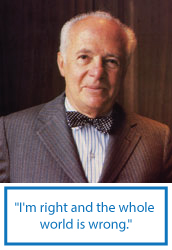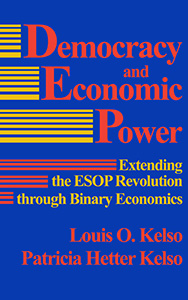“If capital ownership is good for the rich, it is a thousand times better for the middle class and the poor.”
(Louis O. Kelso)
“The low credibility of government and of all lesser institutions in America today is a consequence of our own increasingly hollow democracy. It is reflected in the rising domestic crime rate and the social and political alienation of people in all walks of life, except for the rich and their sycophants. The real collapse of American ideological leadership in the world can best be seen in the feebleness and confusion that characterizes American foreign policy. The handwriting on the wall is clear: America must rethink the meaning of democracy and set about within its borders to rationalize its economic policy into one that synchronizes the shift from labor intensive to capital intensive production, with universal capital ownership and the payment of the full wages of capital to capital owners, so to restore economic democracy to our economy. We should democratize our plutocratic capitalist economy before we preach democracy to others.”
(Louis O. Kelso, 1984)
“People are hungering for property — for a secure, permanent and independent link with spaceship earth that ownership represents and which only ownership can protect or defend. It is humiliating to possess nothing, to own nothing, and hence to produce nothing and to count for nothing.”
(Louis O. Kelso and Patricia Hetter, Washington Post, June 18, 1972)
“The trouble with today’s techniques of finance is that they’re designed to make the rich richer. None are designed to make the poor richer. That’s why the poor are poor. Because they’re not rich.”
(Louis O. Kelso, San Francisco Examiner & Chronicle, 1978)
“The Roman arena was technically a level playing field. But on one side were the lions with all the weapons, and on the other the Christians with all the blood. That’s not a level playing field. That’s a slaughter. And so is putting people into the economy without equipping them with capital, while equipping a tiny handful of people with hundreds and thousands of times more than they can use.”
(Louis O. Kelso, Bill Moyers: A World of Ideas, 1990)
“Conventional wisdom says there is only one way to earn a living, and that’s to work. Conventional wisdom effectively treats capital (land, structures, machines, and the like) as though it were a kind of holy water that, sprinkled on or about labor, makes it more productive. Thus, if you have a thousand people working in a factory and you increase the design and power of the machinery so that one hundred men can now do what a thousand did before, conventional wisdom says, ‘Voila! The productivity of the labor has gone up 900 percent!’ I say ‘hogwash.’ All you’ve done is wipe out 90 percent of the jobs, and even the remaining ten percent are probably sitting around pushing buttons. What the economy needs is a way of legitimately getting capital ownership into the hands of the people who now don’t have it.”
(Louis O. Kelso, Journal Asset Based Finance, 1982)
“Socialism has been discredited. Plutocracy is in the process of being discredited. Democratic capitalism has yet to be tried.”
(Louis O. Kelso and Patricia Hetter Kelso, Democracy and Economic Power, 1991)
“There is a wonderful word that has fallen into disuse as the economic conditions that gave it vitality have faded away — competence. Its oldest meaning, now obsolete, is sufficient supply, or a sufficiency. Its second meaning is property, or means sufficient to defray the costs of the necessities and conveniences of life: sufficiency without excess. The word further extends to the condition of possessing or enjoying such sufficiency — living in peace and competence, or the quality or state of being functionally adequate, or having sufficient knowledge, judgment, skill, or strength . . . . Having a competence is still the American economic ideal. The hope and chance of obtaining a competence is American economic opportunity. The right to have and hold a competence, once obtained, is a fundamental American right. Taken together, these conditions add up to economic happiness as the founding fathers understood it when they declared its pursuit on a parity with the right to life and liberty. Not enormous hoards of unusable and unspendable wealth, but competences and the recovery of individual hope and prospect — these are still the dream of the American people and the proper and necessary goals of U.S. economic policy.”
(Louis O. Kelso and Patricia Hetter Kelso, Democracy and Economic Power, 1986)
“Alienation, which is growing rampant in our society and in all other countries of the globe, begins with economic alienation. Economic alienation begins with the erosion of productive power, which each man who has only his labor to sell, must necessarily suffer in an industrial society.”
(Louis O. Kelso, 1968)
“Monopoly is the death of capitalism and those who insist on it should migrate to a totalitarian state.”
(Louis O. Kelso, The Fallacy of Full Employment)
“There is no future for those who cannot or will not think.”
(Louis O. Kelso, In Lectures and Conversation)
“The basic moral problem that faces man as he moves into the age of automation, the age of accelerating conquest of nature, is whether he is really fit to live in an industrial society; whether his institutions will adjust rapidly enough; whether he will rivet himself with an absurd institution like full economic order when it is not only unnecessary but unadministratable in anything but a slave society; whether freed from necessity to devote his brain to the production of goods and services, he can address himself to the work of civilization itself.”
(Louis O. Kelso, 1964)


